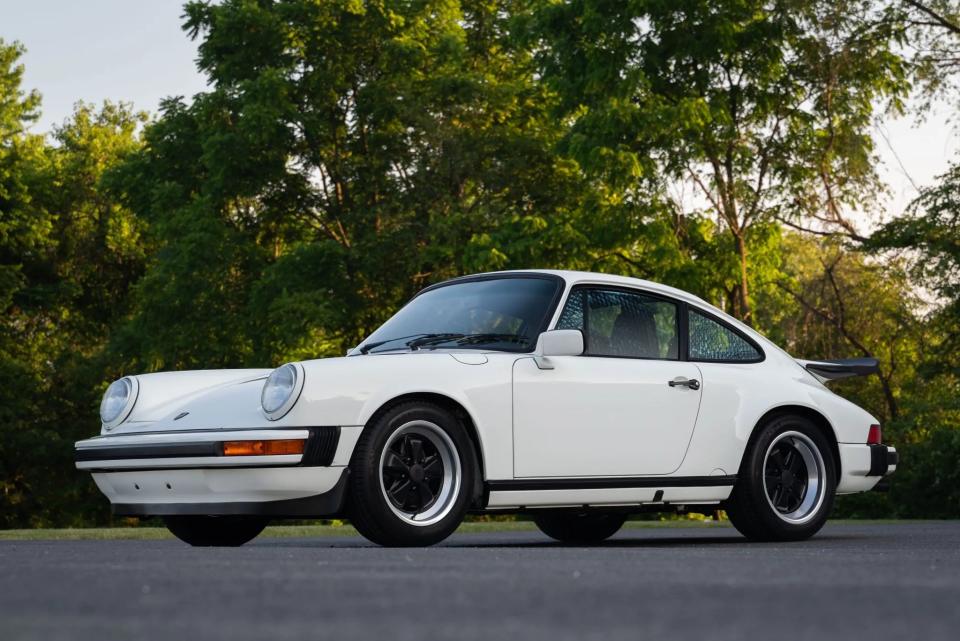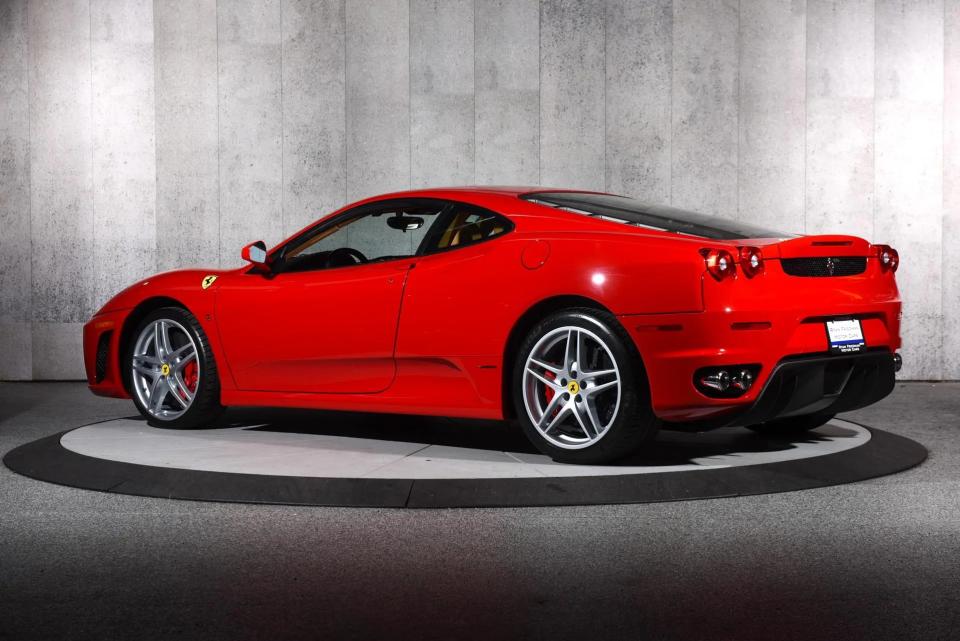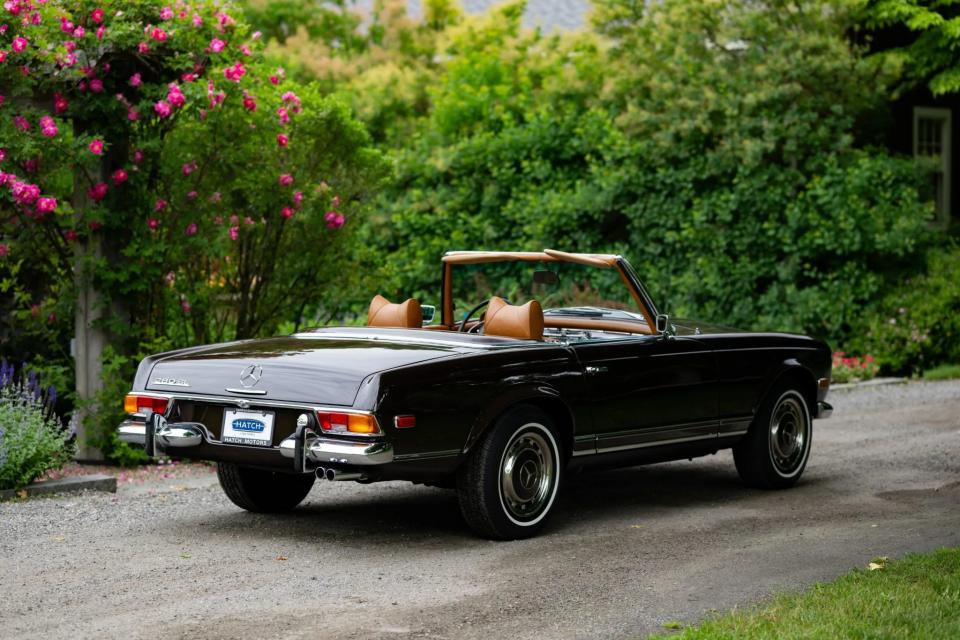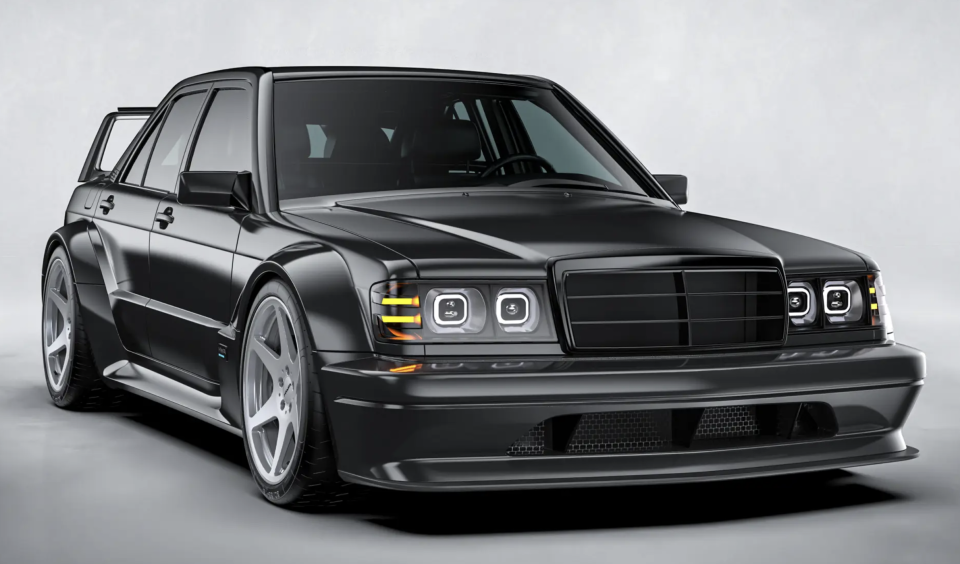Despite a general cooling off in the collector car market, a few recent sales have bucked that trend in a surprising way. And it’s hard to say if they’re genuine outliers, too: each example below has a certain quality or characteristic that can help explain its sale price, but some make more sense than others. To wit, a Ferrari that just a few years ago seemed like any garden variety mid-engined exotic sold for nearly half a million dollars.
For this case, we can thank the surge of demand for cars with manual transmissions, but comparable examples over the past year have sold for much less. An unloved but low-production 911 from the ’80s just went for over $300,000. A Mercedes 280 SL for more than $200,000. And a build slot, an opportunity to buy an HWA EVO, not even a physical car, went for almost twice the car’s starting price.
More from Robb Report
The car auction market has become more transparent in recent years with sites like Bring a Trailer, which you can use to give you a rough idea of how much a car’s worth has risen or fallen over time, along with the opinions of internet commenters who think that a given car is overvalued or undervalued or valued just right or “well-bought.” As a rule, cars are terrible investments, which hasn’t stopped many people from investing in them and probably never will. All of which makes the secondary market a fascinating thing to study. Let’s get into the details.
Best of Robb Report
Sign up for Robbreport’s Newsletter. For the latest news, follow us on Facebook, Twitter, and Instagram.
Click here to read the full article.
1988 Porsche 911 Carrera Club Sport


It wasn’t so long ago when late ’80s 911s were out of fashion with values that reflect that. They were even arguably cheap. The 911 Carrera Club Sport, however, is a different story, and for good reason. Produced in limited quantities between 1987 and 1989 — 340 total worldwide, with only 28 units sold in the US — the Club Sport was developed to appeal to drivers who favored lightweight and performance beyond what the standard Carrera offered. As such, the Club Sport weighed around 155 pounds less than the standard car, thanks to the removal of air conditioning, sunroof, sound-deadening material, rear seats, power windows, and even reduced underbody sealer. For the US market, Carrera Club Sports were equipped with a 3.2-liter air-cooled flat-six whose output was identical to the standard car (214 horsepower), but featured hollow intake valves and revised DME (Digital Motor Electronics) that raised the RPM limit from 6,250 to 6,840 rpm. The Getrag G50 transmission was outfitted with a short throw and revised ratio that helped knock half a second off the sprint to 60 compared to the standard car. A limited-slip differential also came standard.
This beautifully presented example from 1988 retains its original paint in Grand Prix White and has clocked a criminally low 15k miles over 36 years—that’s just over 400 miles a year. It’s also a two-owner car that’s shockingly original, the only modification being a catalytic converter bypass pipe that’s easily removable and impermanent. Though the Club Sport doesn’t exactly scream exotic, its low production volume and special factory touches sent this example’s value soaring to the tune of more than $300,000. Late ’80s 911s are uncool no longer.
2009 Ferrari F430


Launched in 2004, the Ferrari F430 borrowed from a familiar playbook by the Italian automaker: mid-engine, flat-plane crank V8, rear-wheel drive, and the choice of a manual or automated manual gearbox. With the exception of the transmission choice, Ferrari has successfully followed this recipe since 1975. After all, if it ain’t broke… Making nearly 485 horsepower from a 4.3-liter naturally aspirated V8, the F430 hit 60 mph in the mid-three second range and sold well with total production estimated to be just above 15,000 units. But by the time Ferrari released the F430, many manufacturers were focused on outright speed and less on driver engagement. There was an industry-wide obsession with Nürburgring lap times and 0-60 figures, which meant manual transmissions began falling out of favor—even the early flappy paddle gearboxes fired off faster shifts than what was humanly possible. As such, Ferrari and other OEMs began to gradually phase out models with manuals, with Ferrari ending production of manual-equipped cars in 2010.
This 2009 F430 narrowly escaped the clutches of Ferrari’s focus on ultimate speed and is one of an estimated 1,500 units to feature a good ‘ole six-speed manual. A glorious gated six-speed manual to be exact. In what might be a record price for an F430, this classically specced 2009 model—Rosso Corso over beige leather—with 7k miles on the clock sold, in a multiple of its namesake, for $430,000.
1971 Mercedes-Benz 280 SL


The grace, class, and elegance of the Mercedes-Benz 280 SL simply cannot be overstated. Its design has withstood the test of time, firmly cementing itself in the pantheon of the finest automotive styling. Produced between 1967 and 1971, the 280 SL (internal code W113) was a development of the outgoing 230 SL and 250 SL, which were created to strike a harmonious balance between sportiness and comfort. Despite being the ultimate representation of the W113 SL, the 280 only developed 158 horsepower in US market models from a 2.8-liter naturally aspirated inline-six, and most featured four-speed automatic transmissions. So much for sporty, but the looks more than made up for it. Due to the shape of the hardtop—a slightly concave design—the W113 was given the nickname “pagoda.”
Made in the final year of production, this recently restored 1971 280 SL is finished in an apt hue called Tobacco Brown and features a sumptuous Cognac leather interior. (It really is the automotive equivalent of a cigar and cognac, no?) Further enhancing its grand touring appeal are air conditioning, power steering, and a gorgeous Becker Europa II radio. All that beauty doesn’t come cheap, however, with this particular 280 SL going for a hair below $215,000 on Bring a Trailer.
HWA EVO


Riding the momentum of the white-hot restomod market, German racing outfit HWA has recently taken the sheets off its own build. Called the HWA EVO, it’s an homage to the Mercedes 190 E 2.5-16 Evolution II of the early ’90s, a low-volume model that was built to satisfy DTM homologation regulations (502 were built, to be exact). For power, the original Evo II relied on a 2.5-liter naturally aspirated inline-four cylinder, which developed 232 horsepower thanks to engineering input from British engine tuner Cosworth. To appeal to today’s restomod buyer, however, HWA has thrown out the idea of using a four-cylinder and instead has developed a brawnier solution in the form of a twin-turbocharged V6 that makes 500 horsepower. Naturally, the bodywork is made entirely from carbon fiber and HWA has located the transmission to the rear of the car in transaxle form to optimize the weight distribution. The design language doesn’t stray too far from the original’s; the essence of the Evo II remains, but modern touches like LED headlights and larger wheels—forged six-spoke staggered 19” and 20”—bring the HWA EVO into a new era of performance.
HWA will produce 100 units of the EVO, with prices starting at around $800,000. Last month, however, RM Sotheby’s sold a build slot for an EVO at just shy of $1.5 million, indicating a strong demand for the Mercedes restomod.
